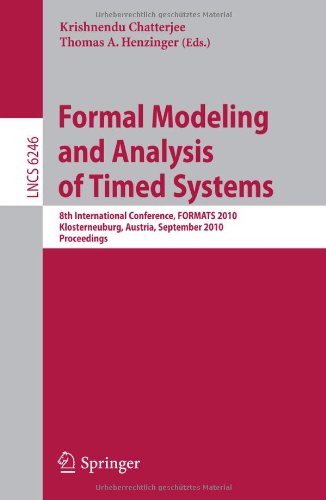

Most ebook files are in PDF format, so you can easily read them using various software such as Foxit Reader or directly on the Google Chrome browser.
Some ebook files are released by publishers in other formats such as .awz, .mobi, .epub, .fb2, etc. You may need to install specific software to read these formats on mobile/PC, such as Calibre.
Please read the tutorial at this link: https://ebookbell.com/faq
We offer FREE conversion to the popular formats you request; however, this may take some time. Therefore, right after payment, please email us, and we will try to provide the service as quickly as possible.
For some exceptional file formats or broken links (if any), please refrain from opening any disputes. Instead, email us first, and we will try to assist within a maximum of 6 hours.
EbookBell Team

5.0
88 reviewsThis volume contains the papers that were presented at the 8th International Conference on Formal Modeling and Analysis of Timed Systems (FORMATS 2010), held September 8–10, 2010, at IST (Institute of Science and Technology) Austria, in Klosterneuburg, Austria. The modeling andanalysis oftiming aspects of systems is a keyproblem that has been treated independently in several di?erent communities in computer science and related areas. Researchers interested in semantics, veri?cation, re- timescheduling,andperformanceanalysisstudymodelssuchastimedautomata and timed Petri nets, the digital design community focuses on propagation and switching delays, and designers of embedded controllers need to take into - count the time requiredby controllersto compute their responses after sampling the environment. Although the timing-related questions in these separate c- munities have their own speci?c nature, there is a growing awareness that there are basic problems that are common to all of them. In particular, all of these disciplines model and analyze systems whose behavior depends on combinations of logical and timing constraints between occurrences of events. The aim of FORMATS is to promote the study of fundamental and practical aspects of timed systems, and to bring together researchers from di?erent d- ciplines that share an interest in the modeling and analysis of timed systems. Typical topics include (but are not limited to): – Foundations and Semantics: theoretical foundations of timed systems and languages; comparison between di?erent models (timed automata, timed Petri nets, hybrid automata, timed process algebra,max-plus algebra, pr- abilistic models).